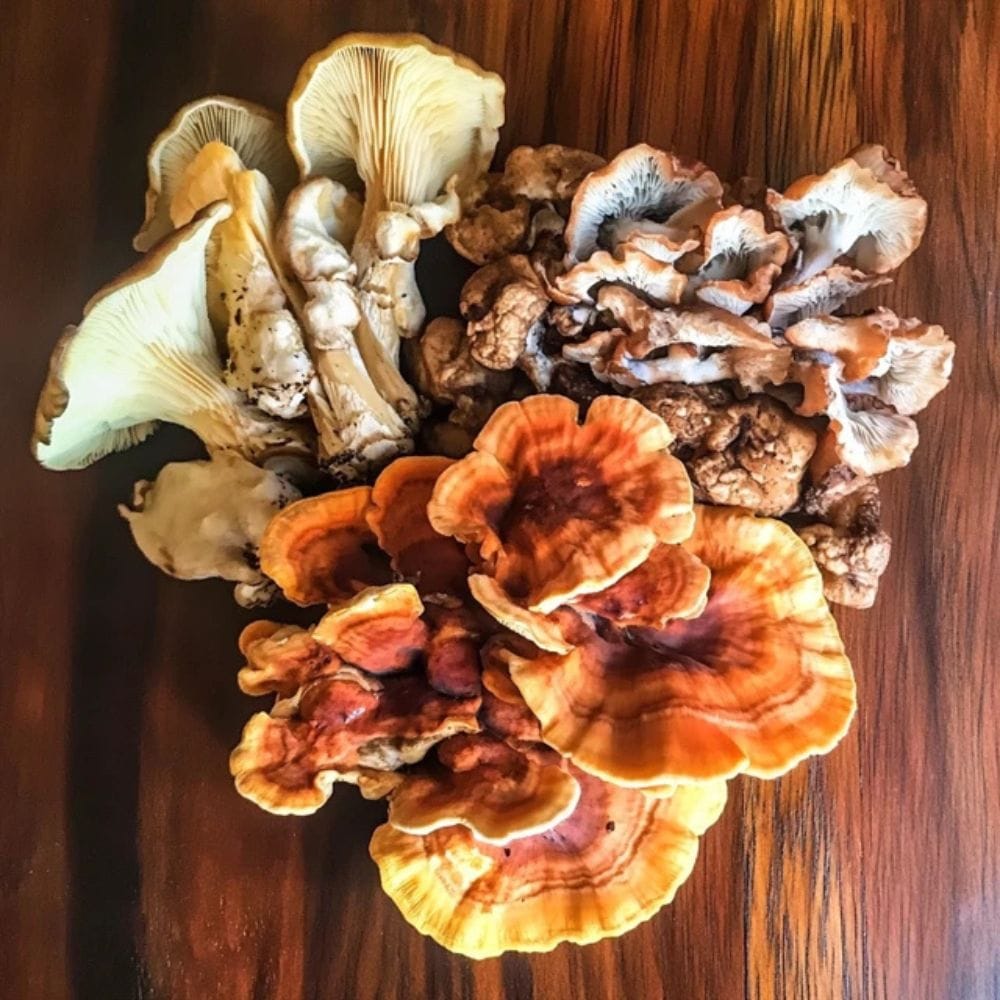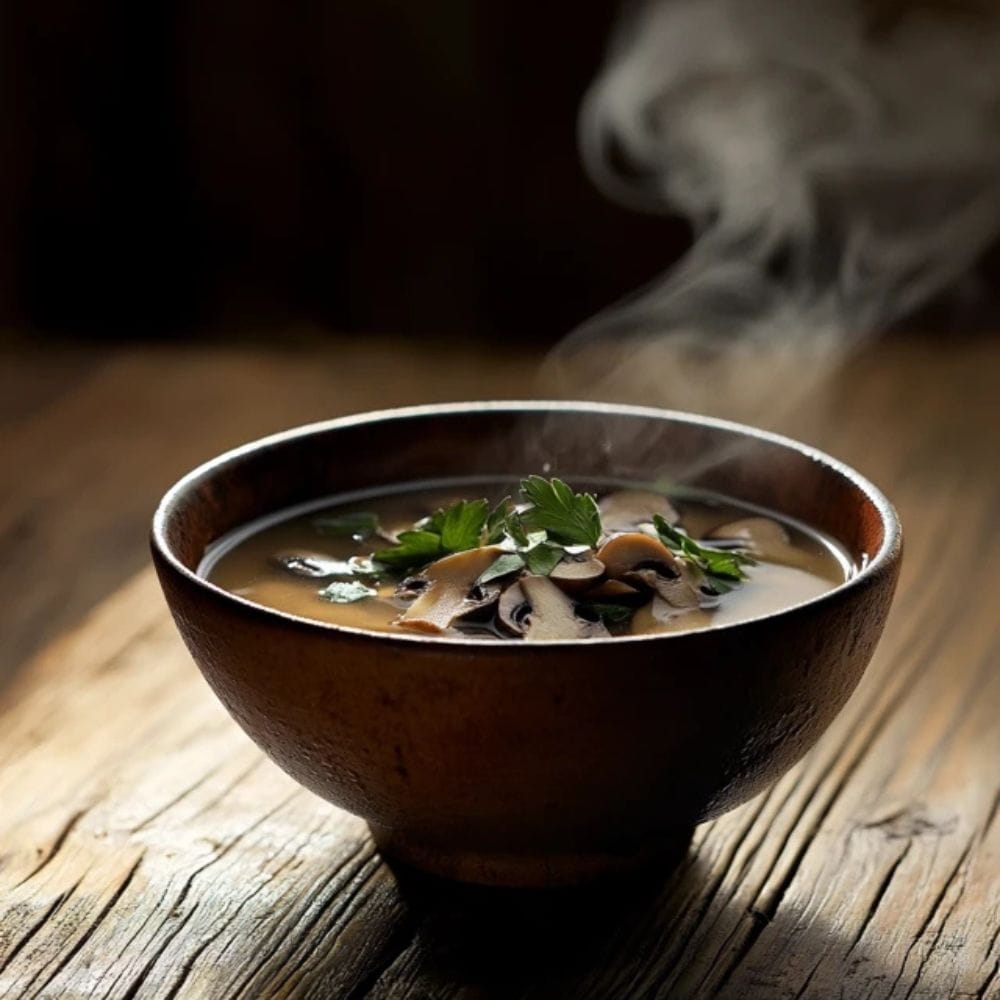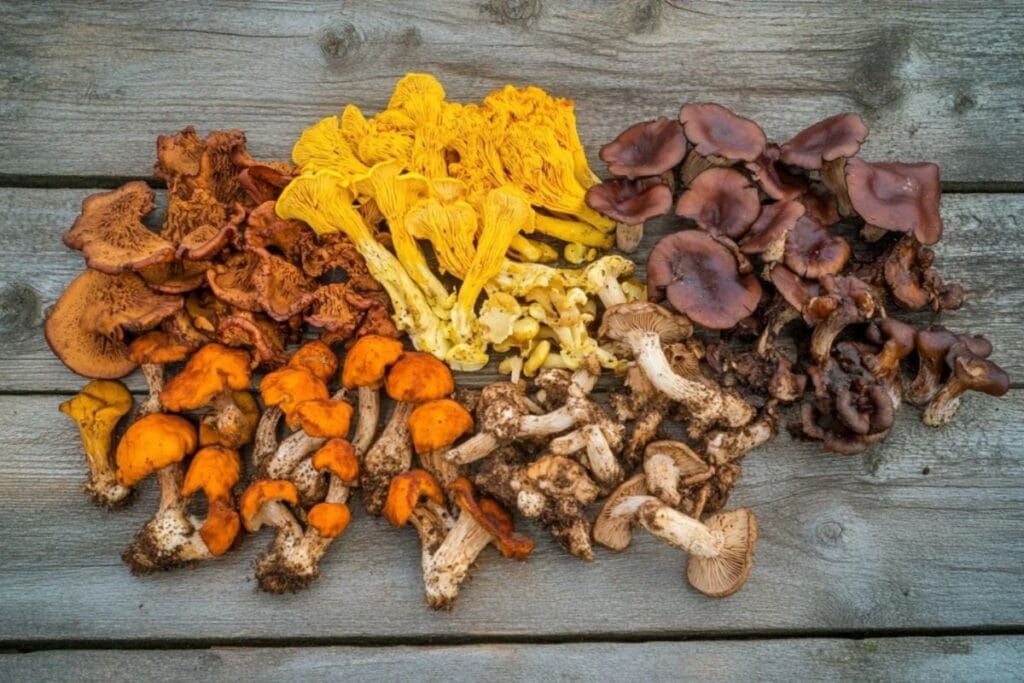Mushrooms have fascinated people for centuries, both as culinary delights and medicinal wonders. But amidst the myriad of varieties, one question stands out: which mushroom is the healthiest? With their diverse nutrient profiles, mushrooms are more than just delicious additions to meals—they’re nutritional powerhouses with unique health benefits. From boosting immunity to supporting brain health, the benefits of mushrooms make them an essential part of a healthy diet.
Understanding Mushroom Nutrition

Nutritional Profile of Mushrooms
Mushrooms are a treasure trove of essential nutrients. They’re low in calories yet rich in vitamins like B-complex vitamins (B2, B3, B5), essential minerals such as selenium and potassium, and an impressive dose of dietary fiber. These edible fungi also contain unique compounds like ergothioneine, a potent antioxidant linked to cellular protection and longevity.
For instance, one cup of white button mushrooms provides around 15 calories, 2.2 grams of protein, and nearly no fat. Other varieties, like shiitake and portobello, offer additional benefits such as enhanced flavor and higher vitamin D content when exposed to sunlight. For more details on the nutritional benefits of different mushrooms, check out nutritional benefits of various mushroom types.
Key Nutritional Highlights of Common Mushrooms
| Mushroom Type | Calories | Protein | Key Nutrients |
|---|---|---|---|
| White Button | 15 | 2.2 g | Vitamin D, Selenium |
| Shiitake | 34 | 2.5 g | Copper, Vitamin B5 |
| Portobello | 18 | 2 g | Potassium, Ergothioneine |
Health Benefits of Eating Mushrooms
Mushrooms provide an array of health benefits beyond basic nutrition. For one, they are excellent sources of antioxidants, which combat free radicals in the body and may help prevent chronic diseases. They also contain beta-glucans, known for boosting immune function and lowering cholesterol levels.
Moreover, the unique polysaccharides in mushrooms have shown potential in reducing inflammation, improving gut health, and even offering protection against certain types of cancer. With their combination of essential nutrients and medicinal properties, mushrooms rank high among functional foods.
“Mushrooms act as both food and medicine—a rare combination in the natural world.”
Exploring Button Mushrooms: Everyday Health Heroes
While exotic varieties like maitake and reishi often top the list when asking which mushroom is the healthiest, button mushrooms shouldn’t be overlooked. These everyday staples are rich in nutrients like potassium, vitamin B6, and selenium, making them a practical and nutritious option for daily meals. They contribute to heart health, boost immunity, and pair well with countless recipes due to their mild flavor. To dive deeper into their benefits, explore this guide on button mushrooms’ benefits and recipes. Additionally, if you’re wondering how button mushrooms compare in terms of healthiness, this article on whether button mushrooms are good or bad offers valuable insights.
Criteria for Determining Which Mushroom Is the Healthiest
Nutrient Density in Mushrooms
Nutrient density refers to the concentration of beneficial nutrients relative to calorie content. Mushrooms excel in this area, making them ideal for weight-conscious individuals. A perfect example is the maitake mushroom, which is rich in polysaccharides and potassium, yet remains low in calories.
When evaluating the healthiest mushrooms, nutrient density is a critical factor. Mushrooms with higher concentrations of vitamin D, selenium, and antioxidants often outperform others in terms of health benefits.
| Nutrient-Rich Mushrooms | Key Nutrients | Unique Benefits |
|---|---|---|
| Reishi | Triterpenoids | Immune modulation, anti-inflammatory effects |
| Shiitake | Lentinan | Cholesterol reduction |
| Maitake | Beta-glucans | Blood sugar regulation |
Bioactive Compounds in Mushrooms
Bioactive compounds like beta-glucans, ergosterol, and chitin give mushrooms their medicinal edge. Beta-glucans are particularly noteworthy, as they enhance immune responses and reduce cholesterol. Ergothioneine, found in mushrooms like portobello and porcini, acts as a cellular antioxidant and has potential anti-aging properties.
Scientists also highlight ergosterol, a precursor to vitamin D, which mushrooms can convert when exposed to sunlight. This conversion makes mushrooms one of the few plant-based sources of vitamin D, essential for bone health and immune function.
Which Mushroom Is the Healthiest? Top Contenders
Reishi (Ganoderma lucidum)
Reishi mushrooms, often called the “king of mushrooms,” are renowned for their medicinal properties. They contain bioactive compounds like triterpenoids and polysaccharides, which contribute to their anti-inflammatory and immune-boosting effects. These mushrooms have been used for centuries in traditional Chinese medicine to reduce stress, improve sleep, and support liver function.
| Key Benefits of Reishi |
|---|
| Immune system enhancement |
| Stress reduction |
| Potential anti-cancer effects |
Shiitake (Lentinula edodes)
Shiitake mushrooms are not only culinary delights but also health champions. They’re rich in lentinan, a polysaccharide with proven immune-modulating effects. Studies have shown that consuming shiitake mushrooms can help lower cholesterol and reduce inflammation, making them a favorite in functional food circles.
Maitake (Grifola frondosa)
Known as the “dancing mushroom” in Japan, maitake mushrooms are celebrated for their ability to regulate blood sugar levels. Their abundance of beta-glucans makes them highly effective in strengthening the immune system. They also support cardiovascular health by lowering cholesterol and improving arterial elasticity. Incorporating maitake into your meals can promote overall metabolic balance and heart health.
| Key Benefits of Maitake |
|---|
| Blood sugar regulation |
| Immune system enhancement |
| Cardiovascular health support |
Maitake mushrooms are incredibly versatile. You can enjoy them roasted, sautéed, or included in soups and stews. Their earthy flavor pairs well with a wide variety of dishes, making them an easy addition to your diet.
Lion’s Mane (Hericium erinaceus)
Lion’s Mane mushrooms are easily recognizable due to their shaggy, cascading appearance. They are renowned for their neuroprotective properties, containing compounds like hericenones and erinacines, which stimulate the production of nerve growth factor (NGF). This helps repair and regenerate nerve cells, making Lion’s Mane a potential aid for brain health and cognitive function.
Emerging research also highlights their ability to reduce anxiety and depression symptoms by supporting the nervous system. For individuals seeking improved mental clarity and focus, Lion’s Mane is a top contender for the title of healthiest mushroom.
| Why Choose Lion’s Mane? |
|---|
| Enhances cognitive function |
| Reduces symptoms of anxiety |
| Supports nerve regeneration |
Chaga (Inonotus obliquus)
Chaga mushrooms, known as antioxidant powerhouses, primarily grow on birch trees in cold climates. They are rich in melanin and polyphenols, which significantly enhance their antioxidant capacity. These properties make Chaga effective in combating oxidative stress, strengthening the immune system, and possibly slowing the growth of cancer cells.
| Chaga’s Health Benefits |
|---|
| High antioxidant content |
| Supports immunity |
| Reduces inflammation |
For centuries, Chaga has been consumed as tea or used in tinctures to harness its health benefits. While it’s not commonly used in culinary dishes, its extracts and powders are widely available, making it a convenient addition to any wellness routine.
Comparative Analysis of Mushroom Health Benefits
Antioxidant Levels in Mushrooms
Antioxidants play a critical role in protecting the body against damage caused by free radicals. Among the various mushroom species, Chaga and porcini boast exceptionally high levels of antioxidants. In fact, their content often surpasses that of many fruits and vegetables. Antioxidants like ergothioneine and glutathione, found in these mushrooms, promote cellular health and may help prevent chronic diseases.
Comparison of Antioxidant Levels
| Mushroom Type | Key Antioxidants | Primary Benefit |
|---|---|---|
| Chaga | Polyphenols, Melanin | Cellular protection |
| Porcini | Ergothioneine, Selenium | Anti-aging and immune support |
| Shiitake | Glutathione, Vitamin D | Reduces oxidative stress |
Incorporating antioxidant-rich mushrooms into your daily meals provides essential nutrients and contributes to long-term health. By consuming the healthiest mushrooms, you also lower your risk of developing conditions linked to oxidative damage.
Immune System Enhancement from Mushrooms
Mushrooms are often praised for their remarkable immune-boosting properties. Compounds like beta-glucans, present in maitake, reishi, and shiitake mushrooms, activate immune cells such as macrophages and natural killer (NK) cells. These compounds improve the body’s ability to fight off infections while reducing the risk of immune-related diseases.
For example, reishi mushrooms are particularly effective at modulating the immune system, making them beneficial for individuals with autoimmune conditions or compromised immunity.
“Including mushrooms like reishi and shiitake in your diet can provide your immune system with a natural and effective boost.”
Incorporating Healthy Mushrooms into Your Diet

Culinary Uses of Mushrooms
Mushrooms offer endless culinary possibilities, enhancing the flavor and nutrition of various dishes. Shiitake mushrooms, for instance, add a smoky, umami depth to broths and soups. Maitake mushrooms complement roasted vegetables and grains. Portobello mushrooms, with their hearty texture, can even serve as a plant-based alternative to meat in burgers or sandwiches.
| Ways to Cook Mushrooms |
|---|
| Sauté with garlic and olive oil |
| Add to soups, stews, or curries |
| Roast with herbs and spices |
Experimenting with preparation techniques helps you unlock the unique flavors of each mushroom variety. Consistently adding the healthiest mushrooms to your meals ensures you’re reaping their nutritional benefits.
Supplement Forms of Mushrooms
For individuals who prefer supplements, mushrooms are available in concentrated forms like powders, capsules, and tinctures. Lion’s Mane capsules, for example, are popular for boosting cognitive health, while reishi extracts are used to alleviate stress and promote relaxation. Supplements are particularly convenient for those with busy schedules, allowing easy access to the health benefits of mushrooms.
When choosing a supplement, look for products labeled “dual-extracted” to ensure they contain both water-soluble and fat-soluble compounds. This guarantees a full spectrum of health benefits.
| Top Mushroom Supplements |
|---|
| Lion’s Mane for brain health |
| Reishi for stress relief |
| Maitake for immune system support |
Dosage and Safety Considerations for Mushrooms
While mushrooms are safe for most people, consuming them in moderation is crucial. Overconsumption of medicinal mushrooms may cause side effects like digestive discomfort or allergic reactions. If you’re using mushroom supplements, always follow the recommended dosage, as taking excessive amounts could lead to imbalances.
For fresh mushrooms, proper cleaning and cooking are essential to remove potential contaminants. Avoid consuming wild mushrooms unless identified by an expert, as some varieties can be toxic.
| Safety Tips for Mushroom Use |
|---|
| Follow recommended supplement dosages |
| Cook mushrooms thoroughly |
| Consult experts for wild mushrooms |
Which Mushroom Is the Healthiest? This question highlights the incredible potential of mushrooms as both flavorful ingredients and health-enhancing superfoods. Adding varieties like Lion’s Mane, Maitake, and Chaga to your diet doesn’t just elevate the taste of your meals—it significantly boosts your overall well-being. By exploring their unique benefits and choosing the right mushrooms, you can fully embrace these nutritional wonders for a healthier and more balanced lifestyle.
Factors Influencing Which Mushroom Is the Healthiest
Growing Conditions for the Healthiest Mushrooms
The healthiest mushrooms owe much of their nutrient profile to their growing environment. Factors such as soil quality, light exposure, and moisture levels play critical roles in determining the mushroom’s nutritional content. For instance, mushrooms grown in nutrient-rich soil are more likely to contain higher levels of essential minerals like selenium and potassium. Similarly, when mushrooms like shiitake and maitake are exposed to ultraviolet (UV) light, their vitamin D levels increase significantly.
Wild mushrooms, such as porcini and Chaga, often have superior nutrient profiles compared to their farmed counterparts. However, they are also more susceptible to environmental toxins, like heavy metals, depending on where they grow. This makes sourcing mushrooms from clean, reputable locations crucial for ensuring their health benefits.
| Factors Affecting Nutrition | Impact |
|---|---|
| Soil Nutrient Content | Higher mineral absorption |
| UV Light Exposure | Boosted vitamin D levels |
| Environmental Pollutants | Reduced safety and nutritional quality |
Preparation and Cooking Methods for the Healthiest Mushrooms
How you prepare mushrooms has a profound effect on their nutrient retention. For example, boiling or overcooking mushrooms can significantly deplete water-soluble vitamins like vitamin B2 and B5. On the other hand, methods such as sautéing or grilling can enhance the availability of certain antioxidants. For instance, cooking increases the concentration of ergothioneine, one of the key compounds responsible for mushrooms’ health-promoting properties.
Consuming raw mushrooms is another option, especially for varieties like white button mushrooms. However, certain types, such as shiitake and maitake, require cooking to deactivate naturally occurring compounds that could upset digestion. By choosing the right cooking method, you can preserve the nutritional integrity of the healthiest mushrooms and maximize their health benefits.
| Cooking Method | Effect on Nutrients |
|---|---|
| Boiling | Reduces water-soluble vitamins |
| Sautéing | Enhances antioxidant levels |
| Grilling | Preserves minerals and enhances texture |
Recent Research on Mushroom Health Benefits
Studies on Disease Prevention with the Healthiest Mushrooms
Recent studies highlight the role of mushrooms in reducing the risk of chronic diseases. The healthiest mushrooms, such as reishi, maitake, and Lion’s Mane, have shown potential in combating conditions like cancer, diabetes, and heart disease. For example, beta-glucans found in maitake mushrooms regulate blood sugar levels, making them particularly beneficial for individuals with type 2 diabetes. Similarly, reishi mushrooms have demonstrated properties that inhibit the growth of cancer cells in preliminary trials.
Research also emphasizes the cardiovascular benefits of mushrooms. Compounds like lentinan in shiitake mushrooms have been shown to lower cholesterol levels and improve arterial health, while antioxidants in Chaga reduce oxidative stress, a key factor in heart disease.
“Incorporating the healthiest mushrooms into your diet could be a game-changer for disease prevention.”
| Disease Prevention Benefits | Mushroom Type |
|---|---|
| Blood Sugar Regulation | Maitake |
| Cancer Cell Growth Inhibition | Reishi |
| Oxidative Stress Reduction | Chaga |
Innovations in Mushroom-Derived Pharmaceuticals
Mushroom compounds are increasingly being used in modern medicine. Pharmaceutical companies are now extracting bioactive compounds like beta-glucans, ergothioneine, and triterpenoids to create targeted therapies. For instance, Lion’s Mane mushrooms are being explored for their potential in treating neurodegenerative diseases like Alzheimer’s, thanks to their ability to stimulate nerve growth.
Reishi mushrooms, long known for their medicinal properties, are used in stress management supplements and immune-boosting products. Meanwhile, Chaga’s antioxidants are being incorporated into skincare and anti-aging treatments. As science advances, the healthiest mushrooms are proving to be valuable resources in both preventive and curative healthcare.
| Mushroom-Based Innovations | Application |
|---|---|
| Lion’s Mane | Neuroprotective drugs |
| Reishi | Stress relief and immune modulation |
| Chaga | Skincare and anti-aging treatments |
FAQs About Which Mushroom Is the Healthiest
What is the most nutrient-dense mushroom?Can mushrooms boost the immune system?Are there any risks associated with consuming medicinal mushrooms?How can I incorporate more healthy mushrooms into my diet?Do cooking methods affect the health benefits of mushrooms?
Final Thoughts on Which Mushroom Is the Healthiest
The healthiest mushrooms offer a blend of culinary delight and unmatched health benefits. Whether you choose maitake, Lion’s Mane, or Chaga, these nutritional powerhouses can boost your immune system, protect your cells, and improve overall well-being. Including them in your diet is not just a dietary choice—it’s a commitment to better health. Explore different varieties, experiment with recipes, or try supplements to fully harness the benefits of these natural wonders.






